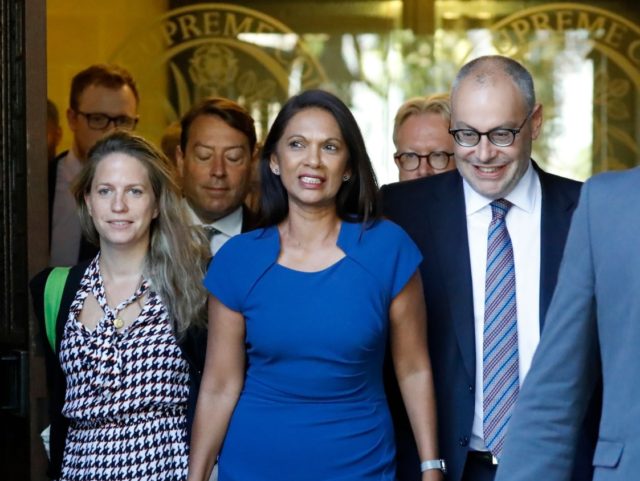The UK Supreme Court in London has heard its first day of submissions on the legality of the suspension of Parliament by the Prime Minister, which saw the government lawyer questioning whether the judges even had the authority to rule on the matter.
This month has seen the suspension — or Prorogation, as it is known in Westminster jargon — of the longest Parliament in modern British history, allowing a new legislating term to begin, an essential development the government claims to bring forward a new domestic agenda. Yet anti-Brexit campaigners claim the suspension has an ulterior motive, to deprive Britain’s predominantly Remain-supporting Members of Parliament of time to work against Brexit in the chamber.
The Prorogation was instantly challenged when announced, with simultaneous cases being put through the English, Scottish, and Ulster (Northern Irish) courts to stop the suspension going ahead. The English and Ulster courts found in favour of Boris Johnson’s government, while the Scottish found in favour of the campaigners on appeal.
Gina Miller Vows to Block No Deal Brexit in Court https://t.co/lPx9Fit3St
— Breitbart London (@BreitbartLondon) July 14, 2019
Now the matter has gone from the national courts to the Supreme Court, the highest in the United Kingdom. The first day of hearings on Tuesday saw Lord Pannick, acting for Brexit frustrating campaigner Gina Miller, accusing the government of having acted improperly, accusing the Prime Minister of having a political motive for Prorogation.
The Advocate General Lord Keen, however, said in his capacity defending the government that the separation of powers between the executive and the judiciary meant it wasn’t appropriate for judges to rule on wholly political matters anyway. This is the position the English and Scottish courts originally found, before the opinion of the Scots was changed on appeal.
British newspaper The Times reports the words of Lord Keen, who told the 11 Supreme Court judges Tuesday that the Prorogation of Parliament was governed by convention and not law, and that in any case, it was the right of the government to act in its own advantage. In a statement for Boris Johnson, it was said:
The courts have no jurisdiction to enforce political conventions. Although they can recognise the operation of a political convention in deciding a legal question, such as the extent of a duty of confidentiality, they cannot give legal rulings on its operation or scope, because those matters are determined within the political world.
…The arena into which the appellant suggests the courts should enter necessarily involves attempting to fashion some other set of rules or factors for doing so. It is not explained what they are.
However, whatever they might be contended to be, they would necessarily be both highly uncertain and constitutionally inappropriate. They would moreover inevitably drag the courts into areas of the most acute political controversy in a sphere controlled, to the limited extent it is, by legislation and convention alone.
Brexit: Gina Miller’s Supreme Court Showdown over Suspending Parliament Begins https://t.co/fsBrliHlxh
— Breitbart London (@BreitbartLondon) September 17, 2019
The case is expected to last another two days, with the judges making their ruling on Friday or Monday.
If the court finds in favour of the government, the status quo is maintained and Parliament will re-open with a new session and a government declaration of priorities for new laws made in the House of Lords by the Queen. If the court agrees with the complainants, it may rule the Prorogation illegal and order the resumption of the previous session, or order a new session to begin immediately.
Legal analysis quoted by the Daily Telegraph suggests the day broadly went in the complainant’s favour, but with two more days to run it is too early to suggest which way the judges may ultimately sway.
The irony that the case against the government is being supported by former Prime Minister John Major has already played out — the former Tory leader himself prorogued Parliament for political benefit in the 1990s, but hasn’t seemed shy about criticising Boris Johnson for doing the same. Tory grandee Iain Duncan Smith said of Major’s position Tuesday: ““All I can say is that his purpose in doing this must be to give the Supreme Court a ready example of hubris. This is the Prime Minister who prorogued Parliament in 1997 during the Cash for Questions saga!”

COMMENTS
Please let us know if you're having issues with commenting.